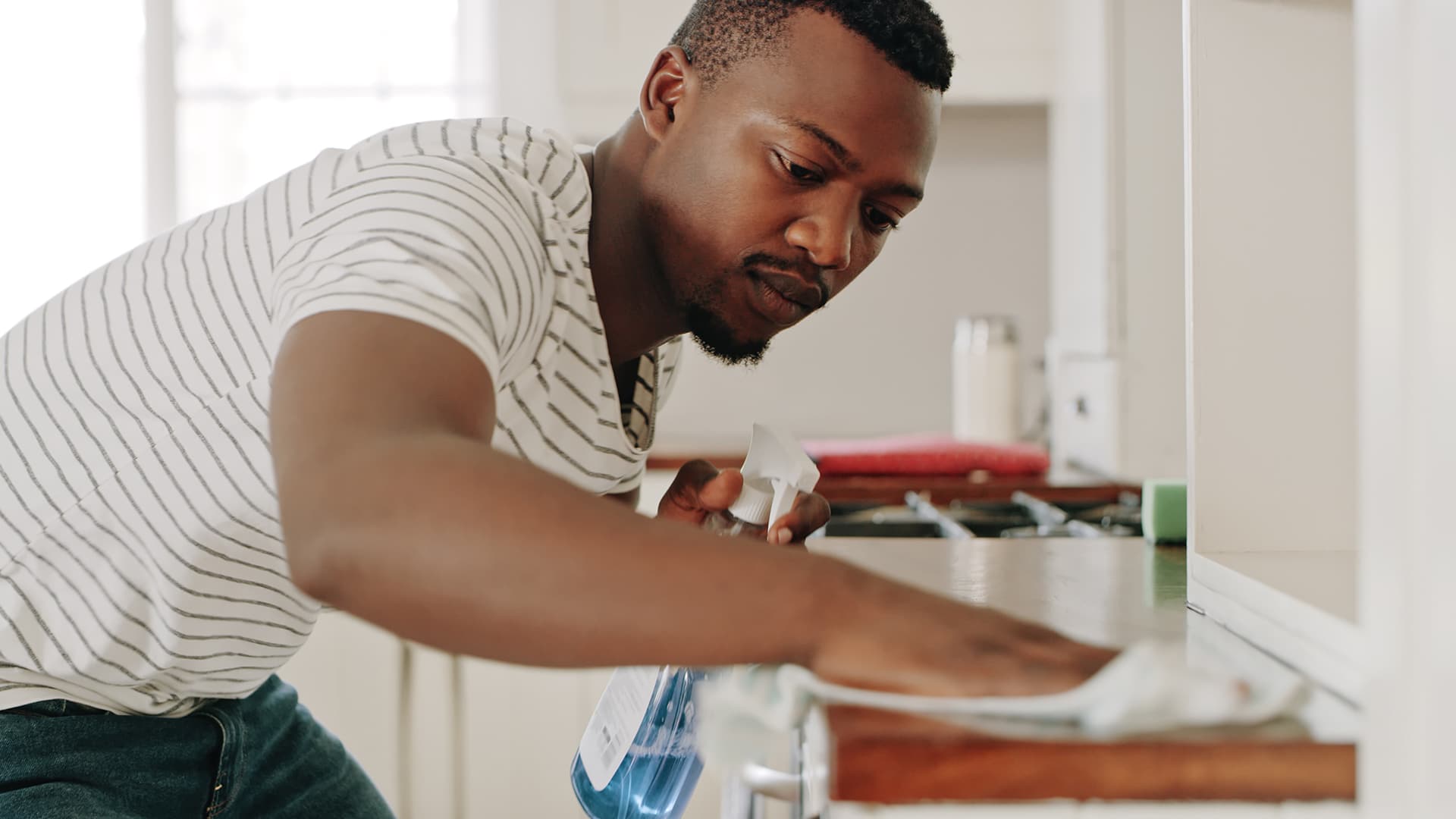ATLANTA, G.A, September 22, 2022 — Stop HIV Atlanta offers sex-positive and queer-centric resources to Atlantans affected by the HIV crisis. With the current monkeypox outbreak, we have expanded our comprehensive portfolio of resources to help those especially vulnerable to the virus.
As recommended by the CDC, people with monkeypox should remain isolated at home or at another location for the duration of their illness, which typically lasts 2-4 weeks. Isolation is a valuable prevention strategy, as current data suggests that monkeypox is transmissible until all symptoms are resolved. However, information about properly conducting self-care or how to tend to a space during an infection period is not readily available. Monkeypox patients or their caregivers should routinely clean and disinfect their environment during an infectious period to avoid contamination. Below, you can find out more about helpful cleaning and disinfection methods for cleansing your space during isolation.
Why Do I Need to Clean and Disinfect My Space?
People with monkeypox should isolate themselves at home if they don’t require hospitalization. During this time, monitoring worsening symptoms and being mindful of how the virus can spread throughout your space is essential.
Amid isolation, a monkeypox patient’s body fluids, respiratory secretions, and lesion materials can spread throughout their environment. The CDC reports that Poxviruses can survive in linens, clothing, and environmental surfaces, particularly in dark, cool, and low humidity settings. Similarly, other closely related Orthopoxviruses can stay in households for several weeks or months. Disinfection is an efficient method for combating these persistent viruses, so a patient’s home, vehicle, and other spaces should be sanitized.
What Kind of Disinfectant Should I Use?
If your household is affected by an active case of monkeypox, consider an EPA-registered disinfectant to clean your space. In instances of a rare or novel virus outbreak, it’s crucial to use disinfectants that have been tested and registered to combat specific pathogens.
After identifying your certified disinfectant, read the product’s directions and precautionary statements. In doing so, pay attention to the disinfectant’s “use sites” and “surface types” to ensure your product is the best fit for your environment.
What Surfaces Do I Need to Clean and Disinfect?
During their isolation, people with monkeypox or their caretakers should regularly clean and disinfect their homes, especially parts they commonly occupy or touch. The same also applies to patients who have recovered and are out of isolation, as they should clean their space to minimize the risk of infection to visitors or other household members.
Below, we have compiled a list of household components that should be cleaned and disinfected during and after your monkeypox isolation.
Laundry
Before leaving isolation, people with monkeypox should thoroughly wash their used
clothing, linens, other bedding materials, towels, and fabric items. If using an
in-home laundry unit, the patient should transfer their belongings in an impermeable bag or container that can be cleaned afterward. If an in-home laundry unit is not accessible, patients should coordinate with their local public health department to locate other laundry options.
Hard Surfaces in Household and Vehicle
People with monkeypox should routinely clean and disinfect their household’s hard
surfaces, particularly commonly touched ones, like tables, countertops, door
handles, toilet flush handles, faucets, light switches, and floors. Patients should also disinfect their kitchen’s interior surfaces, including the inside of refrigerators, freezers, and cabinets, and they should also wash their soiled dishes and eating utensils. In addition, if the patient used their vehicle during isolation, they should sanitize their car’s interiors.
Waste Disposal
Waste management routines generally are not affected by monkeypox isolation as
collectors have existing procedures for waste materials from individuals with infectious
diseases. However, the patient should have a dedicated, lined waste bin in their space throughout their isolation. Any disposable items in direct contact with the patient’s skin should be put in a sealed plastic bag and disposed of in a personal trash can. When disposing of the garbage bag, the person with monkeypox or other household members should wear protective gloves.
How Should I Sanitize During Sexual Activity?
If you engage in sexual activity throughout your isolation, whether with a partner or by yourself, it’s essential to clean and disinfect your environment. Sanitizing surfaces, fabrics, clothes, toys, fetish gear, and other objects used during sex efficiently limits transmission post-isolation. During the sanitation processes, it’s important to not introduce anything to your body, or use sanitation products that were made specifically for toys or gear and follow to guidelines on the package.
According to the CDC, monkeypox can survive longer on porous materials, like clothing or bedding, than on non-porous materials, like plastic, glass, or metal surfaces. Toys or gear made out of glass, metal, or plastic are safer than those made out of porous materials, but they should not be shared if one party has an active monkeypox infection. Cleaning all objects that come into contact with the patient’s skin is vital. Despite disinfection efforts, parties involved in sexual scenarios should monitor the presence of symptoms and communicate thoroughly about concerns or questions. You and your partners should also discuss harm reduction strategies to get the most out of your sex life while ensuring everyone offers informed consent.
About Stop HIV Atlanta:
Stop HIV Atlanta is a non-profit organization offering educational resources to prevent the propagation of HIV in disproportionately affected communities. We provide inclusive, zero-judgment information and resources to those seeking access to HIV services in Fulton, Gwinnett, DeKalb, and Cobb Counties. The testing, prevention (PrEP), and treatment resources we refer to interested parties are always confidential and secure. Learn more about our mission and services by visiting www.stophivatl.org or emailing us at [email protected].
